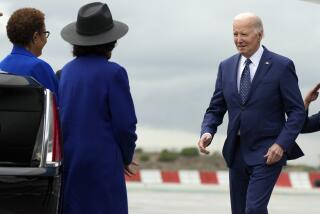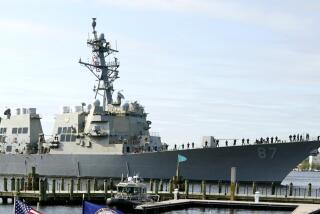In Dubai World, Capt. Hamad rocks
- Share via
I’VE ALWAYS HATED suspense, so I was disappointed when the Bush administration announced a 45-day security review of Dubai Ports World, the United Arab Emirates-owned company to which the president plans to entrust the management of some major U.S. seaports. You heard right -- 45 days. In the Internet era, that’s several lifetimes.
So I decided to take matters into my own hands. With a decade of human rights sleuthing behind me -- not to mention my parallel career as Detective Mommy, capable of determining, with a single withering glance, the identity of the person who put purple marker all over the living room wall -- I was certain I could ferret out any security problems afflicting Dubai Ports World.
Herewith, my report:
A) Background
Disclaimer first: I have never been to Dubai. Regrettably, human rights researchers are seldom called upon to conduct fact-finding missions in Tuscany, the Swiss Alps or Dubai, playground of the Arab world. Still, some Googling reveals that Dubai does have its little human rights problems. And I mean “little.” According to Anti-Slavery International, Dubai is an epicenter of human trafficking, including the trafficking of thousands of small boys who serve as jockeys in camel races.
But if one doesn’t mind pretending that Dubai’s camel jockeys, prostitutes and domestic workers are living free and fulfilling lives, Dubai is “the hippest place on Earth,” as Fox News reported in October.
A magnet for the rich and weird (such as entertainer Michael Jackson, spotted last summer fixing his makeup in the ladies room of a Dubai mall), Dubai boasts hotel rooms costing $50,000 a night, an indoor ski slope and extensive cosmetic surgery facilities. Construction starts soon on the world’s first underwater luxury hotel, and islands built to resemble date palm trees and a map of the world are nearing completion. In 2008, Dubai’s latest theme park, Restless Planet, will open, providing tourists the chance to fend off attacks from scientifically accurate replicas of dinosaurs.
B) Analysis
Mike Davis, author of “Dead Cities,” sums it up: in Dubai, “Walt Disney meets Albert Speer on the shores of Araby.”
This is excellent news for Americans. First, Dubai is so astoundingly Westernized and decadent that Islamic extremists loathe it at least as much as they loathe the U.S. -- and this means that Dubai-based companies owned by the UAE have as much incentive as we do to keep out terrorist infiltrators. (Of course, this also may make Dubai Ports World a tempting terrorist target, but you can’t have it both ways).
Second, the U.S. already boasts Disney World and Sea World. Wouldn’t it be fine to add Ports World? The U.S. seaports managed by Dubai Ports World would soon boast casinos, golf courses, theme parks and exclusive cosmetic surgery clinics instead of the measly restaurants and shops that now cluster around even our snazziest seaports. After all, the UAE exists to prove that anything the West can do, it can do better, or at least bigger and more garishly.
C) Threat assessment
Super-sized Dubai-style poor taste may, in fact, be the biggest threat to U.S. ports. Would Dubai Ports World go beyond dinosaurs and develop a theme park in which tourists fend off lifelike terrorists?
Honesty compels me to admit that from a national security perspective, Dubai Ports World’s motto -- “The force that’s breaking the industry mold” -- is not particularly reassuring.
But leave that aside. Here’s the real question: Is Dubai Ports World truly up to the challenge of turning ramshackle American ports into luxury theme parks?
My initial investigation was discouraging. The company’s international website tends toward the pedantic, offering tedious detail concerning quay lengths, intermodal container traffic and gross crane moves per hour, but few hints of luxurious excess.
The company’s United Arab Emirates website (www.dpworld.ae) offers more hope, however. The home page features “Captain Hamad,” a winking cartoon lad in a sailor suit who beckons visitors to the “Kids Zone” for “an unusual tour” and “fun in the game zone.” Need I say that winking sailor boys -- with the words “unusual” and “fun” in close proximity -- are all promising signs of Neverland-style theme parks to come?
Though now that I think of it, there’s something a little off about Captain Hamad. He seems very young. Could he have been illegally trafficked into Dubai? Sure, you may say he’s just a cartoon, but hasn’t there been something in the news lately about terrorist Islamic cartoons? Or maybe it was cartoons about Islamic terrorists. Whatever. Perhaps Captain Hamad is not as he appears.
And then, why can you only find Captain Hamad on Dubai Ports World’s United Arab Emirates website and not on its international site? And why, exactly, is he winking?
I sense a plot.
More to Read
Sign up for The Wild
We’ll help you find the best places to hike, bike and run, as well as the perfect silent spots for meditation and yoga.
You may occasionally receive promotional content from the Los Angeles Times.






